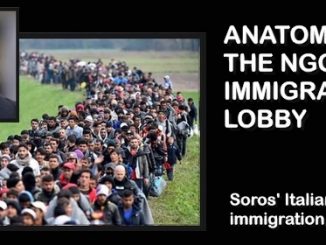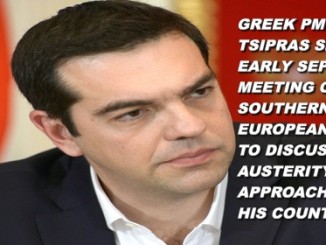
Italy’s Embrace of the Silk Road: A hope for all of Europe
Xi Jinping has carried the Belt and Road Initiative a program into the heart of Europe as a lifeline for all patriots who wish to survive the coming financial collapse.
MATTHEW EHRET
It is no secret that the rise of the Belt and Road Initiative has created a positive dynamic for international relations, seriously challenging the western technocratic system that has come to dominate the Trans-Atlantic region under a financial and bureaucratic dictatorship.
While many branches of the Belt and Road Initiative, which officially united with Russia’s Eurasian Economic Union in 2015, have manifested themselves across Europe in the form of rail lines and ports, to this day no actual agreement has been reached between European powers and China. As President Xi Jinping’s trip to Europe from May 22-28 has demonstrated, there is for the first time a sense that the post-industrial society, dominant in the west since the 1971 floating of the dollar, is no longer the dismal fate of nations. Xi Jinping has carried the Belt and Road Initiative into the heart of Europe as a lifeline for all patriots who wish to survive the coming financial collapse. As of Saturday March 23, the first G7 country has officially joined this program, with Italy’s Prime Minister Conte signing his nation onto the historic Memorandum of Understanding with China which itself creates a great precedent for other nations caught within the Euro cage to join.
The MOU stated:
“The Parties will work together within the Belt and Road Initiative (BRI) to translate mutual complementary strengths into advantages for practical cooperation and sustainable growth, supporting synergies between the Belt and Road Initiative and priorities identified in the Investment Plan for Europe and the Trans-European Networks, bearing in mind discussions in the EU China Connectivity Platform.”
After signing the MOU, Conte made the point that the 10 economic agreements and 18 institutional agreements reached between China and Italy amount to $23 billion, but more important than the money, the agreement carries a new set of “operating procedures” into Italy’s world which tie money to the long term growth of the real economy rather than short term fluctuations of the London-Wall Street controlled markets. It is this new set of rules uncontrolled by western technocrats that keeps the oligarchy up at night. Italy’s Minister for Economic Development Luigi Di Maio stated:
“today is for us a very important day, in which the Made in Italy is winning, Italian firms are winning. We made a step to help our economy to grow. Italy came first with China.”
While the US National Security Council attacked this MOU days before Xi’s visit, stating that it gives “legitimacy to China’s predatory approach”, La Trobe Asia’s Executive Director Euan Graham made the point that there was no choice since the European Union has no policy but austerity to demand of its members.
Graham stated “It’s not hard to fathom Italy’s motives, since much of the country is literally crumbling at the seams.”
A Flank on France
By Sunday March 24, Xi Jinping found himself in France meeting with Emmanuel Macron and signing $63.6 billion of deals, but unlike the case of Italy, no similar MOU to join the Belt and Road Initiative was achieved. Soon thereafter the two heads of state were joined by Angela Merkel and EU President Jean-Claude Juncker in an unannounced meeting. Regardless of Macron’s resistance to join the BRI, it was a brilliant success and demonstrated how China’s response to the hostility often presented by the NATO-led western alliance has been to respond with olive branches and good will at every turn. In an op-ed titled Move Together Towards Common Development published in Le Figaro, President Xi wrote:
“I take great delight in seeing that the China-France relationship is beaming with vigor and spring. On this visit, I will bring with me goodwill toward France. Such goodwill is based on the admiration both from the Chinese people and from myself for the splendid history and culture and the unique charm that France has to offer. It is also inspired by how our two great cultures have engaged and illuminated each other….”
After calling for scientific, nuclear power, and aerospace cooperation and collaboration on the Belt and Road Initiative, President Xi ended his op-ed with: “We need to join hands to tackle challenges, promote global prosperity and stability and build a community with a shared future for mankind.”
China knows that the western banking system is on the verge of a collapse much greater than anything which struck in 2008, and they know that as that reality hits, the desire for real policies that carry real development, growth and survival of the PHYSICAL (rather than merely monetary) aspects of the economy will become a priority for nations of the west. This is a reality which the utopian technocrats attempting to manage a crumbling system like the gods of Olympus cannot deal with, and a reality which should empower citizens across the world to organize for a better world founded on cooperation, common development and long term thinking.
************
Original article
ER recommends other articles by The Duran
BIO: Matthew J.L. Ehret is a journalist, lecturer and founder of the Canadian Patriot Review. His works have been published in Executive Intelligence Review, Global Research, Global Times, The Duran, Nexus Magazine, Los Angeles Review of Books, Veterans Today and Sott.net. Matthew has also published the book “The Time has Come for Canada to Join the New Silk Road” and three volumes of the Untold History of Canada (available on untoldhistory.canadianpatriot.




